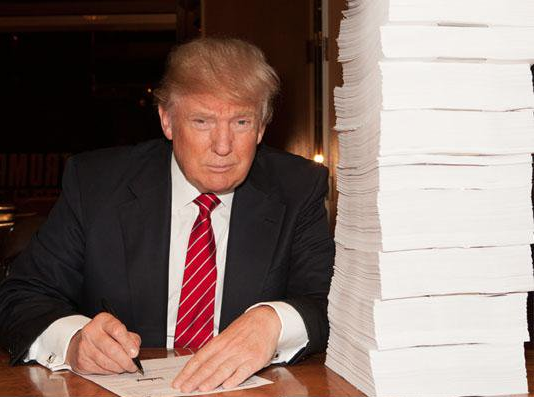The Moral Hazard Hidden in Trump’s Tax Returns
On Saturday, The New York Times released part of Donald Trump’s 1995 tax returns that revealed over $900 million in business losses and concluded that Trump could have avoided paying any federal income taxes for 18 years, deducting up to $50 million a year from his taxable income each year.
If true, Trump may have avoided paying up to $360 million in taxes over 18 years.
Observers have been quick to point out how bad this looks. Despite its legality, it looks bad for Trump to pay no tax for 18 years, while the rest of Middle America did. It looks bad for Trump to say that this “makes him smart,” implying that the rest of Middle America is dumb. It also goes against his campaign’s message that he is a savvy businessman. Others are trying to paint Trump a genius for being able to figure out how to game the tax system.
But a deeper and potentially more disturbing issue is the possible moral hazard lurking in the background for Trump. A moral hazard occurs when a person is shielded from the consequences of a risk in such a way that it makes it easier for them to decide to subject other people to that risk. It looks like that may have been the case for Trump.
In Trump’s case, the tax breaks made it possible to cut the losses on his failed ventures by more than 33%. At most he risked 66% of his investment, and he might have risked no cash at all. The New York Times reports that almost all of Trump’s losses could have been on loans that hadn’t been forgiven, and that most of that $916 million might not have ever been cash out of Trump’s pocket. Trump could have literally risked nothing while bringing in shareholders and investors who were not shielded from the risk. Only “active real estate developers” are entitled to the protections from risk that Trump enjoys.
Trump had way less incentive to avoid reckless business ventures than the investors and shareholders he brought to the table. The question is: How much less? We need to know the degree to which this situation was a moral hazard.
His tax returns would reveal that.
We also need to know if Trump knew this or not. The way he brags about his knowledge of bankruptcy and tax law, there’s a good chance he knew he was risking nothing while luring others in to take significant risks. Leaders often find themselves in situations where they don’t realize they risk less than everyone else, and good leaders are more cautious once they come to realize this.
The commander-in-chief likely deals with moral hazard scenarios more than anyone else in the free world. First, they are often in situations where they make decisions that can incur significant risk on just about everyone in the world, while risking little themselves. War is a good example of this. One of the main arguments for mandatory military service is that presidents and senators would think twice about war if their own children had to fight them. Second, presidents often adopt policy that either regulates, de-regulates, or subsidizes an industry. Any time you do one of these three things, you shift the incentives that are in play, and there is always a risk of inadvertently creating a moral hazard.
Presidents need to be good at recognizing both when they are in moral hazards, and when they might cause someone else to be in one.
If Trump casually and knowingly risked the well-being of thousands of Americans on risky ventures that he knew would cause him no significant harm, while pretending to have skin in the game, we need to know that. If he did this unknowingly, we need to know that. Either way, it would shed light on how he approaches one of the more difficult kinds of moral dilemmas world leaders regularly face.





